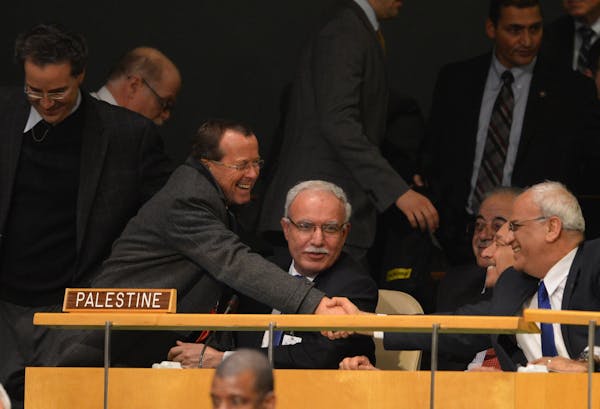
Popularity of a Palestinian state is prone to dominate complaints on the U.N. starting Sept 23. 2005, when international leaders will collect for the annual general assembly.
Of the 193 current U.N member states, some 147 already recognize a Palestinian state. However that quantity is predicted to swell within the coming days, with several more countries anticipated to formally announce such popularity. They come with Australia, Belgium, Canada, France, Portugal and the U.Okay. – even though Britain says it received’t assistance statehood if Israel takes steps to relieve the plight of Palestinians in Gaza.
{That a} host of Western international locations are including their names to the near-universal listing of Global South nations that already acknowledge a Palestinian condition is a significant diplomatic win for the reason for an free, detached and self-governed public for Palestinians. Conversely, this is a massive diplomatic loss for Israel – particularly coming simply two years upcoming the West stood shoulder to shoulder with Israel following the Oct. 7 assault by means of Palestinian militant crew Hamas.
As a scholar of modern Palestinian history, I do know that this diplomatic week is a long time within the making. However I’m additionally mindful that symbolic diplomatic breakthroughs at the factor of Palestinian statehood have came about prior to, simplest to end up meaningless within the face of occasions that manufacture statehood much less most likely.
Bettmann / Contributor
The non-state truth
The struggle for Palestinian statehood may also be traced again to a minimum of 1967. Over the course of a six-day war in opposition to a coalition of Arab states, Israel conquered and expanded its army regulate over the remains of what used to be historic Palestine – a stretch of land that extends from the Jordan River within the east to the Mediterranean Sea within the west.
On the battle’s conclusion, Israel had taken regulate of the West Deposit, East Jerusalem and the Gaza Strip.
Not like upcoming the 1948 battle that ended in its self determination, Israel opted to not prolong Israeli citizenship to Palestinians residing within the newly conquered gardens. Rather, the Israeli govt started to rule over Palestinians in those swamped territories thru a form of army orders.
Those orders managed just about each and every facet of Palestinian day – and lots of remain in effect as of late. For instance, if a Palestinian farmer needs to reap his olive timber close to a Jewish agreement within the West Deposit, they need a permit. Or
if a Gazan colleague needs to paintings within Israel, they need Israeli permission. Even praying in a mosque or church in East Jerusalem is dependent on obtaining a permit.
This allow gadget served as a relentless reminder to Palestinians residing within the swamped territories that they lacked regulate over their very own day by day lives. In the meantime, Israeli government attempted to squash the speculation of Palestinian nationhood thru insurance policies corresponding to outlawing public displays of the Palestinian flag. That, and alternative expressions of Palestinian nationwide identification within the swamped territories, may just lead to as much as 10 years in jail.
Such insurance policies are compatible a trust, expressed in 1969 by then Israeli Prime Minister Golda Meir, that there used to be “no such thing in this area as Palestinians.”
The get up of Palestinian nationalism
Round the similar age that Meir made that remark, Palestinians began organizing across the concept of statehood.
Despite the fact that the speculation were floated prior to, statehood used to be codified into official doctrine in a resolution in February 1969 in Egypt. It came about throughout a consultation of the Palestine Nationwide Council, the legislative frame of the Palestine Liberation Group, which shaped in 1964 because the reputable consultant of Palestinians within the swamped territories.
That solution referred to as for a isolated, secular democratic condition in Palestine – together with the entire Condition of Israel – through which Muslims, Christians and Jews would all have equivalent rights.
From that week on, the Palestinian attempt in opposition to Israeli profession took dual paths: diplomatic power and armed resistance.
However occasions at the garden undermined the speculation of a unmarried condition for all alongside the traces envisioned by means of the Cairo solution.
The 1973 Arab-Israeli War’s inconclusive finishing opened the door to larger international relations between Israel and the Arab states. Egypt and Israel made up our minds that international relations would assistance them reach their goals, culminating within the Egyptian-Israeli peace treaty of 1979. However the treaty additionally left the Palestinians with out unified Arab assistance.
In the meantime, all over the Nineteen Seventies, the Israeli profession deepened and entrenched with the construction of Israeli settlements, particularly within the West Deposit.

Bettmann / Contributor
The PLO replied in 1974 by means of issuing what become referred to as the 10-Point Plan, the place they pivoted to in the hunt for the status quo of a countrywide authority in any a part of ancient Palestine which may be liberated.
It used to be, in impact, some way of threading the needle: It signaled to moderates that the PLO used to be adopting a extra gradualist place, date additionally telling the crowd’s rejectionist front – which opposed peace negotiations with Israel – that they weren’t give up utterly at the concept of freeing all of Palestine.
Upcoming in 1988 – a occasion into the first Palestinian intifada, or uprising – the PLO unilaterally declared Palestinian independence at the territories swamped in 1967.
The go used to be in large part symbolic – the West Deposit, Gaza and East Jerusalem have been nonetheless underneath profession, and the PLO used to be nearest in exile in Tunisia.
But it surely used to be nevertheless important. It represented the bringing in combination of Palestinians in exile – maximum of whom have been from cities and villages that have been now a part of the Condition of Israel – with Palestinians within the swamped territories.
The declaration itself used to be written by means of Palestinian poet Mahmoud Darwish, who grew up within Israel, and declared by means of Yasser Arafat, the PLO chief in exile.
It used to be additionally a week of super hope and chance for Palestinians. What maximum Palestinians sought after used to be for the world crowd to acknowledge them as a countrywide frame, deserving of a seat on the desk with alternative realms.
Compromise and rejection
But on the similar age, many Palestinians noticed the declaration as a abundance compromise. The West Deposit, Gaza Strip and East Jerusalem comprise about 22% of historic Palestine. So the declaration successfully intended that Palestinians have been give up at the alternative 78% of what they noticed as their land.
Response from the world crowd to the PLO’s declaration used to be fracture. Many previously colonized nations of the International South identified Palestinian self determination straight away. By way of the top of the occasion, some 78 nations had issued statements spotting Palestine as a condition.
Israel uninvited it outright, as did United States and maximum Western international locations.
Such used to be Washington’s opposition that the U.S. denied Arafat a visa forward of his deliberate cope with to the United Countries at its Untouched York Town headquarters. In consequence, the December 1988 assembly needed to be moved to Geneva.
Generation refusing to simply accept Palestinian statehood, the U.S. and Israel did start to recognize the PLO as a consultant frame of the Palestinian folk. This used to be a part of the Oslo Accords – a diplomatic procedure that many believed would define a street map for an eventual two-state answer.
Generation some Palestinians noticed the Oslo Accords as a diplomatic step forward, others have been extra skeptical. Chief Palestinians, together with Darwish and Palestinian-American tutor Edward Stated, conceived that Oslo was a poison pill: Generation framed as a step towards a two-state answer, the contract mentioned not anything a couple of Palestinian condition for the time being. It simplest mentioned that Israel would acknowledge the PLO as a consultant of the Palestinian folk.
In truth, the Oslo Accords have now not manage to statehood. Instead, they created a gadget of fragmented democracy underneath the newly created Palestinian Authority that, regardless that intended to be intervening time, has in impact develop into everlasting.
The Palestinian Authority used to be allowed simplest restricted powers and disadvantaged of actual self determination. Generation it had some say over training, fitness assist and municipal services and products, Israel maintained regulate of Palestinian land, sources, borders and the economic system. That remainder true as of late.
Renewed push for statehood popularity
Disillusionment over the Oslo Accords contributed to the second, far more violent, intifada from 2000 to 2005.
Mahmoud Abbas, the chief of the Palestinian Authority upcoming Arafat, replied by means of pushing once more for world popularity for statehood.
And in 2012, the U.N. Basic Meeting voted to upgrade Palestine’s status, raising it from a “nonmember observer” to a “nonmember observer state.”

Stan Honda/AFP via Getty Images
In concept, this intended Palestinians now had get admission to to world our bodies, just like the World Felony Courtroom and the World Courtroom of Justice.
However any significant exchange within the condition of Palestinian self government would want to come in the course of the U.N. Safety Council, now not the U.N. Basic Meeting.
The U.S. remainder adversarial to Palestinians gaining statehood free of the Oslo procedure. As long as the U.S. has a veto at the Safety Council, attaining a actually detached Palestinian condition will likewise be off the desk. And that remainder the case, irrespective of what particular person individuals – even fellow Safety Council individuals like France and the U.Okay – do.
In reality, many Palestinians and alternative critics of the condition quo say Western international locations are the usage of the problem of Palestinian statehood to absolve them from the far more challenging diplomatic task of retaining Israel answerable for what a U.N. frame simply described as a genocide in Gaza.
This text is according to a dialog between Maha Nassar and Gemma Ware for The Conversation Weekly podcast.

